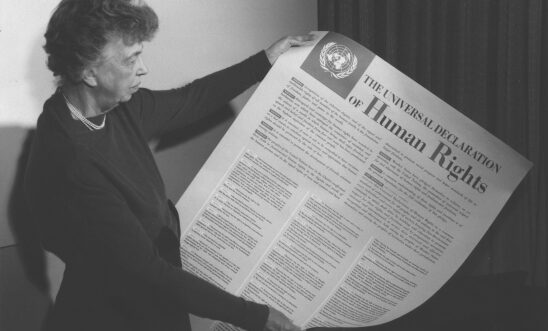Objective:
UN General Assembly Resolution calling upon all states to instruct their Ministers of Education and all education administrators to ensure that every secondary education student before matriculation should receive either electronically or physically a copy of the Universal Declaration of Human Rights and where resources permit classes dedicated to the study of the Universal Declaration of Human Rights
Rationale
Social development requires relevant education, which is politically and morally enshrined in two important places in legally significant commitments that all nations have endorsed – the Sustainable Development Goals (SDGs) and the Universal Declaration of Human Rights.
In this regard, SDG #1 calls for ending poverty. SDG #4 explicitly calls for equitable and quality education for all. SDG #10 calls for the reduction of inequality. Education is obviously critically important for these goals as well. The Universal Declaration of Human Rights (UNHDR) is explicit in Article 26, which states in relevant part:
1. Everyone has the right to education. Education shall be free, at
least in the elementary and fundamental stages. Elementary education shall be compulsory.
2. Education shall be directed to the full development of the human personality and to the strengthening of respect for human rights and fundamental freedoms. It shall promote understanding, tolerance and friendship among all nations, racial or religious groups, and shall further the activities of the United Nations for the maintenance of peace.
The UDHR is a magnificent expression of universal values and the inherent dignity of the every person. These rights require and weave a social fabric where each thread reinforces all the others. In other words, human rights take place in community, and if one wants their rights honored they must know the importance of protecting those same rights in others. That is why the Preamble states that “every organ of society, keeping this Declaration constantly in mind, shall strive by teaching and education to promote respect for these rights and freedoms and by progressive measures, national and international, to secure their universal and effective recognition and observance…”
It is through cooperation and the rule of law that we will be able to fulfill the Sustainable Development Goals. This will be invigorated if education stimulates a greater appreciation of the UN system and especially the values embodied in the Universal Declaration of Human Rights.
Jonathan Granoff is the President of the Global Security Institute, a representative to United Nations of the World Summits of Nobel Peace Laureates, a former Adjunct Professor of International Law at Widener University School of Law, and Senior Advisor to the Committee on National Security American Bar Association International Law Section.








